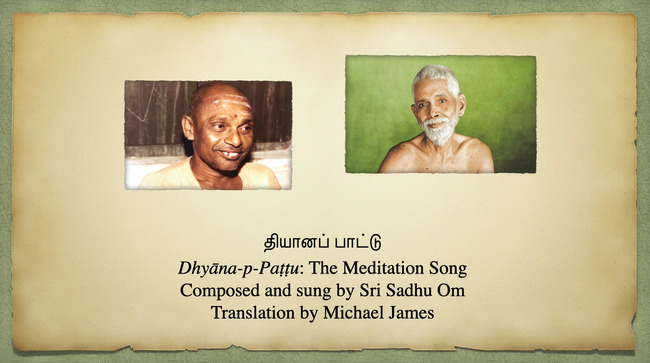தியானப் பாட்டு
dhyana pattu
the Meditation Song
கண்ணை மூடி யமர்ந்துகொள்; கடவு ளென்று நினைந்துகொள்; எண்ணி டாம லெதையுமே யிறைவ னொன்றே நினைந்துகொள். || ௧ ||
kaṇṇai mūḍi yamarndukoḷ; kaḍavu ḷeṉḏṟu niṉaindukoḷ; eṇṇi ḍāma letaiyumē yiṟaiva ṉoṉḏṟē niṉaintukoḷ || 1 ||
1. Closing [your] eyes, be seated. Be thinking of God. Without thinking of anything [else], be thinking of God alone.
காணு முலகை நினைப்பதாற் கடவு ணினைவு போய்விடும் வேணு முறுதி முதலிலே விரும்பித் தியானம் பண்ணுவாய். || ௨ ||
kāṇu mulahai niṉaippadāṟ kaḍavu ṇiṉaivu pōyviḍum. vēṇu muṟudi mudalilē virumpit dhiyāṉam paṇṇuvāy || 2 ||
2. By [your] thinking of the world [you] see, the thought of God will go away. Steadfastness is needed at first, [so] do meditation with love.
எந்த வடிவிற் கருதினும் அந்த வடிவிற் றோன்றுவார் சொந்த வடிவம் பெயரிலார்; சுத்த மோன சின்மயம் || ௩ ||
enda vaḍiviṟ karudiṉum anda vaḍiviṟ ṟōṉḏṟuvār; sonda vaḍivam peyarilār; suddha mōṉa ciṉmayam || 3 ||
3. In whatever form you think [of God], in that form he will appear. He has no form or name of his own. [He] consists of pure, silent consciousness.
இன்ப மான வொருபொரு ளிருக்கு துன்ற னெஞ்சிலே அன்பு கொண்டு தேடினா லளவில் லாத சுகமடீ || ௪ ||
iṉba māṉa voruporu irukku duṉḏṟa ṉeñjilē aṉbu koṇḍu tēḍiṉā laḷavil lāda sukhamaḍī || 4 ||
4. One blissful substance exists within your heart. If [you] seek it with love, unlimited happiness [will be yours].
எங்கு முள்ள கடவுளை யிதய குகையிற் காணலாம் இங்கு கண்ட பிறகுதா னிருப்ப தெல்லா மவன்மயம் || ௫ ||
eṅgu muḷḷa kaḍavuḷai yidaya guhaiyiṟ kāṇalām; iṅgu kaṇḍa piṟahudā ṉiruppa dellā mavaṉmayam || 5 ||
5. In the cave of [our] heart [we] can see God, who exists everywhere. Only after [we] have seen him here, will all that exists [be seen to] consist of him.
எண்ண மறியுஞ் சாக்ஷியா யிறைவ னுன்னு ளிருக்கிறார் எண்ண மோய்ந்த விடத்திலே யிறைவன் வந்து தோன்றுவார் || ௬ ||
eṇṇa maṟiyuñ sākṣiyā yiṟaiva ṉuṉṉu ḷirukkiṟār; eṇṇa mōynda viḍattilē yiṟaivaṉ vandu tōṉḏṟuvār || 6 ||
6. God exists within you as the witness who knows [your] thoughts. Only where [all] thoughts subside, will God come and appear.
எண்ண மோய வழியைக்கேள்; இறைவன் ரமணன் மொழியைக்கேள்: எண்ண மெழும்புந் தருணமே யாருக் கெழுவ தென்றுபார் || ௭ ||
eṇṇa mōya vaṙiyaikkēḷ; iṟaivaṉ ramaṇaṉ moṙiyaikkēḷ; eṇṇa meṙumpun taruṇamē yāruk keṙuva deṉḏṟupār || 7 ||
7. Listen to the path to make thoughts subside; listen to the words of Lord Ramana: At the very moment that a thought rises, see to whom it rises.
எண்ணந் தனக்கே யெழுவதா லிந்த நானா ரென்றுபார் எண்ணுந் தன்னை நோக்கவே யெழுந்த வெண்ண மோய்ந்துபோம் || ௮ ||
eṇṇan taṉakkē yeṙuvadā linda nāṉā reṉḏṟupār; eṇṇun taṉṉai nōkkavē yeṙunda veṇṇa mōyndupōm || 8 ||
8. Since [every] thought rises only to oneself, see who this ‘I’ is. When one looks at oneself who thinks, the thought that had risen will subside and vanish.
பார்க்கப் பார்க்க வுன்னுளே பரம ஞானம் பூக்குமே பார்க்கு மறிவைப் பார்க்கவே பழகிப் பழகி வெற்றிகொள் || ௯ ||
pārkkap pārkka vuṉṉuḷē parama jñāṉam pūkkumē; pārkku maṟivaip pārkkavē paṙahip paṙahi veṯṟikoḷ || 9 ||
9. When you look, look within yourself, supreme knowledge will blossom forth. To see the knowledge that sees, practise, practise and seize victory.
கற்குங் கல்வி பலவிலுங் கடவுட் கல்வி முதலிடம் நற்சி றப்பு யாவிலும் ஞான நிஷ்டை முதலிடம் || ௰ ||
kaṯkuṅ kalvi palaviluṅ kaḍavuḍ kalvi mudaliḍam; naṯci ṟappu yāvilum jñāṉa niṣṭhai mudaliḍam || 10 ||
10. Among the many sciences we learn, the science of God [our real self] is foremost. Among all excellent distinctions, jñāna-niṣṭhā [abiding as consciousness or self-abidance] is foremost.
உட லெடுத்த நோக்கமே யுண்மை யின்பந் துய்க்கவே கடவு ளாகி நின்றுடல் கழற்றி வீசிப் போகலாம் || ௰௧ ||
uḍa leḍutta nōkkamē yuṇmai yiṉban tuykkavē; kaḍavu ḷāhi niṉḏṟuḍal kaṙaṯṟi vīsip pōhalām || 11 ||
11. The purpose for which we have taken a body is only to enjoy true happiness [the bliss of self-knowledge]. Abiding as God, removing and casting away the body, let us go.
தெய்வ மென்ப தருண்மயம் ஜெகமெல் லாமு மிருண்மயம். மெய்யெ தென்று நாடவே, விளங்கு மிந்த வுண்மையே. || ௰௨ ||
deyva meṉpba daruṇmayam jegamel lāmu miruṇmayam; meyye deṉḏṟu nāḍavē, viḷaṅgu minda vuṇmaiyē || 12 ||
12.What is called ‘God’ consists of grace, and the entire world consists of darkness [ignorance or delusion]. When [you] investigate what is real, this truth will shine [clearly].
வாழ்க ரமண சற்குரு! வாழ்க ஞான மார்க்கமே! வாழ்க வான்ம சாந்தியில் வாழும் வாழ்வு வாழ்கவே! || ௰௩ ||
vāṙha ramaṇa saṯguru! vāṙha jñāṉa mārggamē! vāṙha vāṉma śāntiyil vāṙum vāṙvu vāṙhavē! || 13 ||
May Ramana Sadguru flourish!
May his path of knowledge flourish!
May life lived in the peace of self flourish,
May it definitely flourish!

This composition by Sri Sadhu Om, titled "Dhyāna Pattu" or "The Song of Meditation" is a beautiful explanation of Sri Bhagavan's atma vichara. Originally composed for children, it is a valuable gem for children of all ages!The Tamil text, with transliteration and English translation, kindly shared by Michael James, is presented in this video. Sri Sadhu Om's lilting, inspiring rendition is indeed a joy, sung by one who has dedicated himself entirely to his guru, Sri Ramana. om namo bhagavate śrī ramaṇāya
